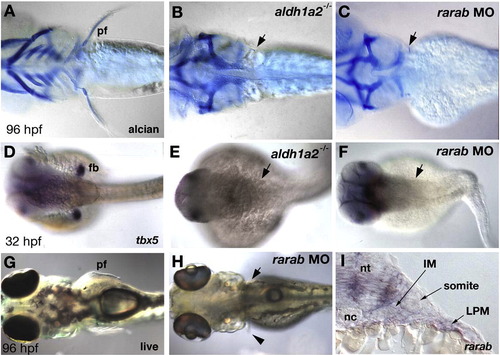
Depletion of rarab alone disrupts pectoral fin budding. (A–C) Alcian blue stained cartilage in larvae (4 dpf). Ventral views, anterior to the left. (A) In controls the pectoral fins protrude laterally just posterior to the skull. (B, C) Lack of fins and fin cartilages in both aldh1a2 mutants (B, arrow; N = 12) and rarab morphants (C, arrow; N = 24). (D–F) tbx5 expression at 32 hpf, detected by whole mount in situ hybridization. Dorsal views, anterior to the left. (D) In controls, tbx5 labels the bilateral pair of early pectoral fin buds, which are absent in aldh1a2 mutants (E, arrow) and rarab morphants (F, arrow; N = 7). (G, H) Live 96 hpf larvae, dorsal views, anterior to the left. rarab morphants occasionally form a small pectoral fin on one side (H, arrowhead). (K) Transverse sections at forelimb levels at 24 hpf reveal rarab expression in the neural tube and lateral plate mesoderm, but absent from the adjacent somite or intermediate mesoderm. Abbreviations: fb, fin bud; IM, intermediate mesoderm; LPM, lateral plate mesoderm; pf, pectoral fin; nc, notochord; nt, neural tube.
|

